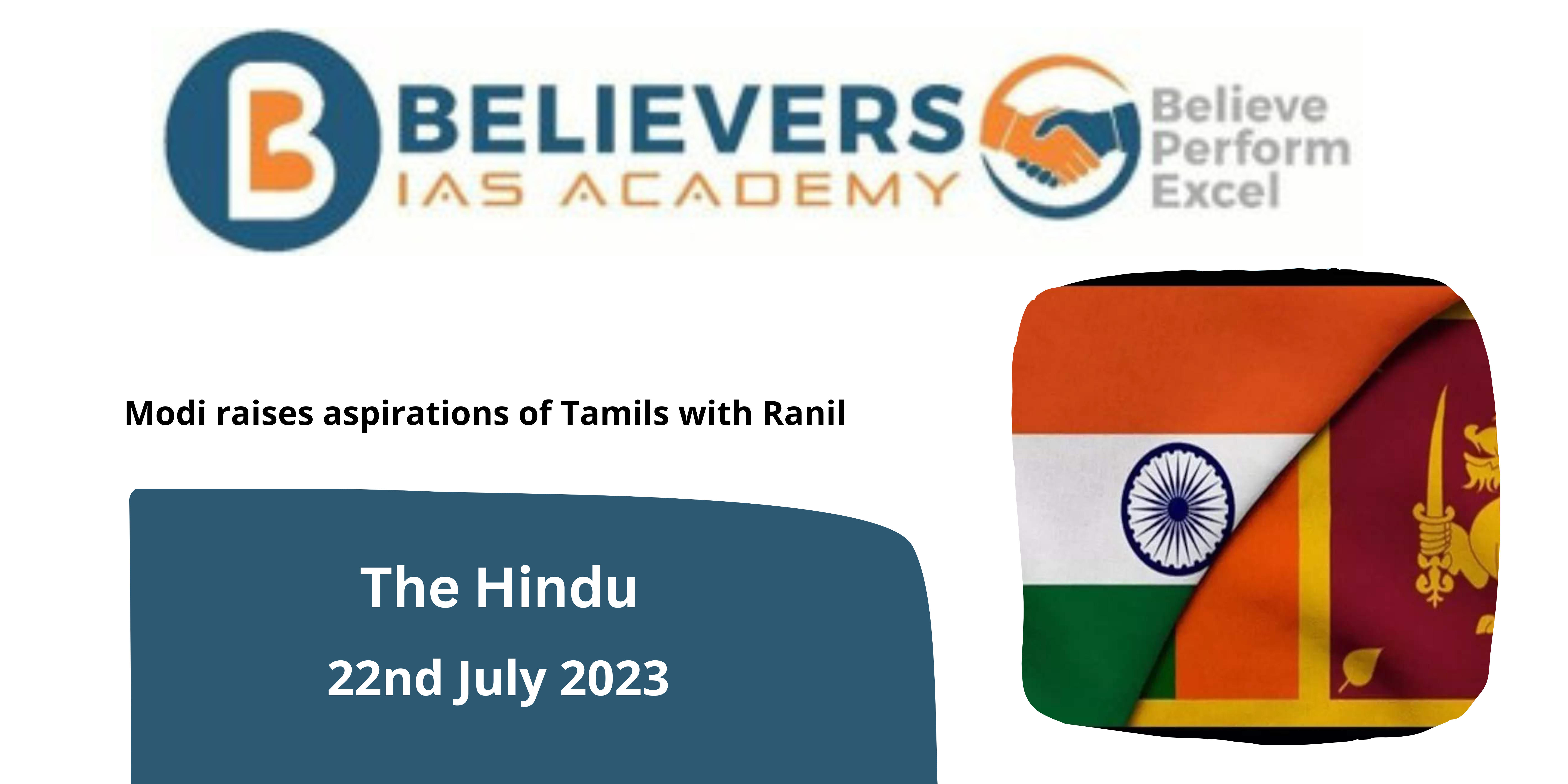Modi raises aspirations of Tamils with Ranil
Context
Prime Minister Narendra Modi stated on Friday that India expects Sri Lanka to execute the 13th Amendment and provide a “life of dignity and respect” for its Tamil community.
What does the 13th Amendment to the Sri Lankan Constitution entail?
- As part of the Indo-Lanka Accord, the 13th amendment was adopted in 1987 to address the ethnic conflict between Tamils and Sinhalese in Sri Lanka.
- The Liberation Tigers of Tamil Eelam (LTTE), who were in charge of the Tamil insurgency, wanted to establish a separate Tamil state because they had long-standing issues with political exclusion and prejudice.
- The amendment sought to establish a system of provincial councils and distribute authority to the provinces, especially the northern and eastern regions with a large Tamil population.
- The nine provinces, including those with majority Sinhalese populations, will get devolution of authority over land, the police, education, health care, agriculture, housing, and money.
- The goal was to increase the political representation of and authority over local matters for the Tamil minority.
- The LTTE and the Sri Lankan government engaged in a protracted and violent civil war as the conflict worsened.
- The 13th amendment defined English as a bridging language to facilitate communication between the two linguistic groups and recognized Tamil and Sinhala as official languages.
- To unify regions with a Tamil majority and provide them more authority, the northern and eastern provinces were first combined to form the North-Eastern Provincial Council.
- The terms of the amendment were not, however, completely enforced by subsequent Sri Lankan governments, which resulted in continued hostilities between the Tamils and the Sinhalese.
- The LTTE’s defeat and Velupillai Prabhakaran’s death in 2009 marked the end of the civil conflict.
- Power-sharing, political autonomy, and reconciliation between the Tamil and Sinhalese people are still crucial concerns that require ongoing work to find a permanent solution despite the end of the conflict.
Why Is It Controversial And Hasn’t Been Implemented Thus Far?
Arguments against the 13th Amendment
- formulated in 1987 as a component of the Indo-Sri Lanka Accord to address the Tamil minority’s involvement in the ethnic strife.
- intended to provide provincial councils additional authority in order to give areas more autonomy.
- The amendment is opposed by the majority Sinhalese and Sinhala nationalist parties.
- They contend that it weakens the Sri Lankan state’s unitary structure and favors a centralized form of government.
- Consider the 13th Amendment to be a legacy of Indian meddling in Sri Lankan affairs; the country is resistant to outside influence.
- The amendment should be completely repealed, according to some Sinhalese parties including Janata Vimukthi Peramuna (JVP), National Freedom Front (NFF), and Jathika Hela Urumaya (JHU).
- The regulations in Sri Lanka have not been properly implemented, particularly when it comes to giving provincial councils control over land and the police.
Tamil Community’s View:
- The Tamil community claims that the provincial councils are not given enough authority under the 13th amendment.
- They feel that the autonomy provided is insufficient to adequately address their complaints and concerns.
- They believe that the provincial councils do not possess sufficient meaningful power to appropriately represent their interests.
What was decided in the present meeting between the leaders of both countries?
- Meeting of the Leaders of India and Sri Lanka: Narendra Modi, the Prime Minister of India, and Ranil Wickremesinghe, the President of Sri Lanka, had bilateral discussions to discuss various issues affecting the two countries.
- Infrastructure Projects to Improve Connectivity: The need of infrastructure projects to improve connectivity between India and Sri Lanka was discussed and stressed by both parties. These initiatives should improve trade, tourism, and interpersonal interactions.
- Development Assistance for Tamils of Indian Origin: The Prime Minister Modi recently unveiled a package of development aid for the 200-year-old Tamil population in Sri Lanka. The purpose of this help is to promote the growth and welfare of this community.
- Rebuilding and reconciliation in Sri Lanka: The leaders talked on Sri Lanka’s ongoing efforts at reconciliation and reconstruction. The inclusive procedure that President Wickremesinghe proposed was used.
- Fulfilling Tamil Population’s ambitions: Prime Minister Modi expressed optimism that Sri Lanka would satisfy its Tamil population’s ambitions. The Tamil community’s issues and demands should be addressed, and its rights and dignity should be upheld, according to this.
- Implementation:India anticipates that Sri Lanka would put into effect the 13th Amendment to its Constitution. The amendment attempts to distribute authority to provincial councils, giving areas with sizable Tamil populations more autonomy.
- Elections for the Provincial Council: As part of the 13th Amendment’s implementation, Sri Lanka is anticipated to hold elections for the Provincial Council. These elections are necessary to form local government and provide regions more power.





